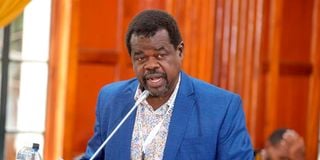Okiya Omtatah loses bid to arrest Finance Act at Supreme Court

Busia Senator Okiya Omtatah.
The Supreme Court has thrown out a case filed by Busia Senator Okiya Omtatah challenging the decision by the Court of Appeal to lift an order by the High Court that had temporarily suspended the implementation of the Finance Act, 2023.
A three-judge bench of the appellate court composed of justices Mohammed Warsame, Kathurima M’Inoti and Hellen Omondi on July 28 lifted the suspension of the implementation of the Act even as National Treasury Prof Njuguna Ndung’u argued that the government was losing half a billion shillings daily due to the freeze.
Justice Mugure Thande of the High Court had on June 30 issued conservatory orders against implementation of the controversial Act that prescribed a raft of new tax measures to fund the budget for the ongoing financial year.
Following the appellate court’s ruling, Mr Omtatah alongside three activists – Eliud Matindi, Benson Otieno and Blair Oigoro – challenged the decision at the Supreme Court seeking the suspension or stay of the Court of Appeal’s ruling.
If Mr Omtatah’s petition had succeeded, it would have led to a fresh freeze on implementation of the Act pending determination of numerous cases filed in court challenging it.
The Busia senator argued that the manner in which the Court of Appeal interpreted and applied Article 23(3) of the Constitution and its own mandate resulted in constitutional injustice.
He argued that the appeal sought to preserve the substratum of the matter pending before the High Court and the appellate court’s ruling had “caused grave injustice to the applicants by pre-empting the substance” of the case that is set for hearing next week.
Mr Omtatah argued that the ruling not only validated but allowed the Act to take effect immediately and that as such, the Court of Appeal unjustly predetermined the substance of the amended petition pending before the High Court and intended appeals, which at the time were yet to be filed before it.
In its dismissal of the petition, the seven-judge bench of Chief Justice Martha Koome, Deputy Chief Justice Philomena Mwilu and justices Smokin Wanjala, Mohammed Ibrahim, Njoki Ndung’u, Isaac Lenaola and William Ouko stated that Mr Omtatah’s petition does not fall within its appellate jurisdiction.
“We are equally not convinced that the decision of the Court of Appeal has occasioned grave injustice to warrant invocation of our inherent jurisdiction. Besides, the intended appeals before the Court of Appeal have since been filed and are to be disposed within 60 days of the impugned ruling,” stated the Supreme Court.
“The applicants’ Notice of Motion dated 5th August, 2023 be and is hereby dismissed. There shall be no orders as to costs,” it ruled.
The ruling is a major win for the Treasury, which had argued that the new tax measures in the Act are intended to generate revenues amounting to Sh211 billion in the FY2023/24.
The exchequer had stated that the suspension of the Act was bound to hinder the collection of such revenue, which is not capable of being recovered in the event the amended petition before the High Court is unsuccessful.
The Treasury has already commenced collecting the new taxes prescribed by the Act, including the 1.5 percent housing levy which is deducted from the gross pay of salaried workers and equally matched by their employers.
Workers were dealt a heavy blow last month after the government backdated the housing levy to cater for July when the Act was supposed to take effect, which saw the housing levy deducted twice from their August pay.
Businesses are also paying a higher turnover tax after the Act raised the tax from 1 percent to 3 percent.
The Act has maintained the lower threshold for businesses eligible for turnover tax at Sh1 million but lowered the upper threshold to Sh25 million from Sh50 million, meaning that businesses who earn between Sh25 million and Sh50 million who have been paying turnover tax will now be paying the 30 percent corporation tax.
Kenyans are also paying an arm and a leg for fuel after the Act doubled value added tax (VAT) on the product to 16 percent up from 8 percent. The energy regulator in last month’s monthly prices review kept fuel prices unchanged after the government opted to apply a subsidy which averted increase of the prices to a new record high.
Further, salaried workers earning between Sh500,000 and Sh800,000 monthly are now paying Pay-As-You-Earn (PAYE) at the rate of 32.5 per cent while those who earn more than Sh800,000 monthly are paying 35 per cent.
Kenyans were from September 1 now also required to pay a tax of 3 percent from the revenue they make by selling a digital asset. The Act has introduced a digital assets tax payable on the income derived from the sale of digital assets as the government seeks to take a pie of the growing digital assets economy.
The Kenya Revenue Authority (KRA), which netted Sh2.17 trillion tax revenue in the FY2022/23, has been tasked to collect Sh2.49 trillion in the current financial year.





